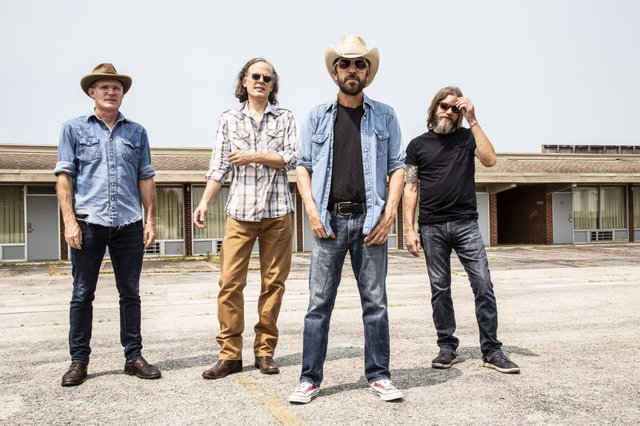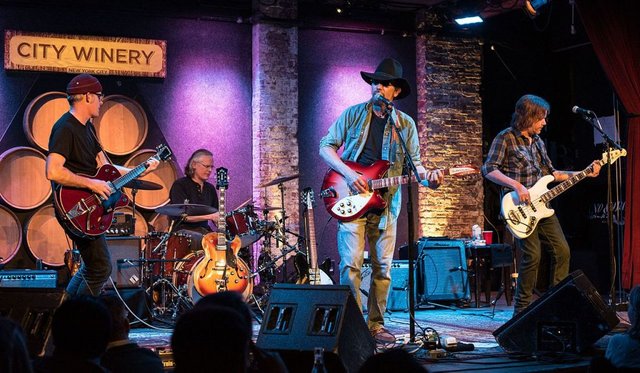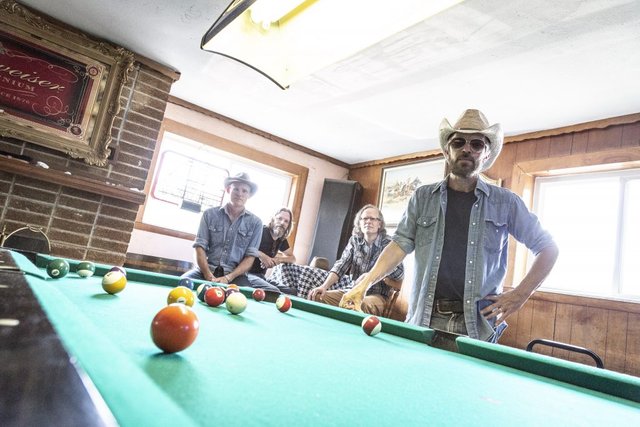Interview | The Bottle Rockets - 30 miles south and 20 miles east…

Interview with Brian Henneman, the frontman for The Bottle Rockets.
Popular music in 2019 is fractured. Splintered. The digital devices of an electronically-evolving world categorizing and continually assigning a surfeit of labels motivated by marketing practices designed to best suit a profit margin.
In the ‘70s, an FM format, circa 1979, would play War, REO Speedwagon, the Alan Parsons Project and Ramones between a commercial and public service announcement. In this century, that would be divided into four genres and to combine them would be digital and streaming sacrilege.
“Today, if you had Black Sabbath and Marshall Tucker that would be two completely separate genres. Back then that was just rock music,” said Bottle Rockets’ frontman and mainstay, Brian Henneman.
Will we ever again hear the grooving sound of the old Aerosmith - “Rocks” and “Toys in the Attic” - the guitar orchestration of Lynyrd Skynyrd, the top-heavy riffs of Montrose or even the original, yet derivative music recorded by Guns ‘N’ Roses? (Rhetorical question)
Henneman believes rock as we knew it is gone.
“We were teenagers in the ‘70s and that’s when that stuff ruled the earth. We were listening to Skynyrd, Aerosmith that kind of stuff...it’s a lost art. It’s gone…there’s still Guns ‘N’ Roses out there but they’re old guys too…there’s no radio for it,” he said.
Elements of that style of rock can still be heard in The Bottle Rockets’ songs and form the basis for part of their sound. When their blistering hit, “Radar Gun”, off of the album “The Brooklyn Side,” busted out of the gate in the mid-nineties that rock influence was front and center. It continues to this day but their latest effort, 2018’s “Bit Logic,” withdrew large sums from their country music bank.
Today, if you had Black Sabbath and Marshall Tucker that would be two completely separate genres. Back then that was just rock music. -Brian Henneman
Americana
Bottle Rockets music today, in all its variations, is classified as Americana. So, what is Americana? That’s debatable. But what isn’t up for argument is that rock and potent strains of country can rent space in the genre.“It’s impacted our career by keeping us in what they call the genre of Americana or alternative country so that’s where this stuff can live. It can’t live on any sort of mainstream radio because there’s no radio for it. It’s just erosion. Time changes things,” Henneman explained.
He said Americana has become the default genre for rock and non-commercial country music.
“Everything is like real exclusive now…you kind of have to do that. There’s so much stuff out there that if you don’t have some guidelines…you don’t know how to search for anything….Americana is the thing that’s got the widest range of stuff going on in it.”
Americana can be defined as alternative country, southern rock, roots-rock, folk, bluegrass, rhythm and blues, blues, rockabilly, Zydeco, cowpunk and surf, and so on and so forth. But that isn’t a set in “rock” description.
Though he said his nieces aren’t particularly fond of Americana there is a multitude of second-generation fans of the genre. Many attend their shows.
“We’ve had fans who have had babies during the course of our band who are now old enough to come to shows. It’s pretty amazing.”

Photo author: Vivian HW Wang Creative Commons Attribution-Share Alike 4.0 International license.
Parallel lines
To gain a broader perspective on the Bottle Rocket sound, it’s important to understand the formation of the band. It was born out of cover bands and parallel lines that were drawn out for two sets of Midwestern songwriters/musicians. And you might have heard of a couple of them. Jeff Tweedy and Jay Farrar. As it turns out, The Bottle Rockets trajectory was closely intertwined with the paths of Wilco and Son Volt.
“We were all from the same area. Basically, if you drew a 30-mile circle around St. Louis, Missouri that’s where we’re from. We were from south of St. Louis - about 30 miles - and they were east of St. Louis, about 20, 30 miles,” Henneman said.
Henneman’s Blue Moons and the Tweedy/Farrar Primitives banged out covers around the St. Louis area with country music being their common thread. Tweedy and Farrar leaned on more of a punk sound while Henneman’s crew pulled from the ‘70’s rock catalog. That’s when they first played together.
“We kind of did the same kind of thing. We didn’t know each other at all in those days,” he commented. “They were so young their moms were driving them to the shows at that point. But we hit it off immediately.”
The music scene in that portion of the American farm belt was devoid of any original country-styled bands during that period so it was inevitable that the two bands would be paired up at local gigs. The adding country-to-rock mix played well and “so it was by process of elimination that we ended up doing shows together because…those guys and these guys there the only two that make any sense around here.”
After the cover bands had their final hurrahs they lost contact with Tweedy and Farrar but not for long.
“Whenever they formed Uncle Tupelo…everything kind of happened naturally at the same time…and we started a band and they started another one and the same thing happened all over again,” Henneman said. “It was kind of like this natural thing that happened 30 miles south and 20 miles east of St. Louis…That’s how we got hooked up with each other and got to know each other.”
And then history repeated itself again. When the bell tolled for Uncle Tupelo, the seeds for The Bottle Rockets were being planted. “We started putting something together again…but at that point everybody sort of split off and did their own thing.” But when the sun of reinvention rose, three bands - all very different from one another - emerged helping to establish the Americana genre.
“We’re older than those guys. We had a different set of influences than they did but what we had in common was the country thing,” Henneman asserted. (Henneman played on Wilco’s debut, “A.M.”) “As far as Jeff and Jay’s differences are, I don’t know what those were but they turned out different as well.”
Records
The Bottle Rocket albums have run the gamut of variation from the countrified “Bit Logic” (their latest) to the rock-oriented “The Brooklyn Side” and one dedicated to the tunes of the psychedelic country hippy Doug Sahm. All without any intention (for the most part).
“The only album that we made a concerted effort to try to direct in any direction at all was the last one “Bit Logic,” he said. “That was the first time in our career we actually made a plan like we’re going to kind of up the country vibe type of thing…other than that we just let it naturally take its course.”
The band’s current lineup is Henneman, voice, and guitar; John Horton, the other guitar; Keith Voegle, bass; and Mark Ortmann, drum kit.
He doesn’t have a favorite Bottle Rockets album. He likens that to a parent preferring a certain kid.
“They’re all different they all have their own personality…and to this day we still do songs off every one…And of course, there’s always a period where your latest one is your favorite.”
Words
Lyrically, Henneman is on point. Maybe because Bottle Rocket words aren’t nonsensical mishmash, contrived or hatched from a stream of consciousness.
“We don’t write fiction,” he quipped. “Another thing I always say is almost every song we’ve ever done is pretty much ‘a police report of the incident.’”
“Radar Gun,” “Indianapolis” and “Building Chryslers” aptly illustrate Henneman’s penchant for slice-of-life stories seasoned with humor. The humor courtesy of his personality and John Prine. “You gotta laugh to keep from crying.” He credits the Boss for inspiring his lyric writing because Springsteen’s narratives were something he could recognize.
“Now that I think of it and I hadn’t thought about this in maybe…ever or forever…probably the guy who got me into that was Bruce Springsteen,” he revealed. “When I was a kid I was listening to frickin’ Rush and stuff like that…what do I know about the ‘Temples of Syrinx?’”
Point well taken, Brian. Petty stands atop his list as the go-to lyricist.
“I don’t care what situation you’re in there’s a Tom Petty line to go with it…I really don’t know if he was a genius or an idiot savant with that…Yet his lyrics are like random thoughts that just pass through my head that’s why they land so hard with me so often,” he said.
And Henneman isn’t hesitant to weigh in on today’s popular songs. An interesting topic to be sure. The à la carte patchwork of music in 2019 has both an upside and ugly head. Take the good with the stomach-turning features I suppose. For Henneman and The Bottle Rockets, it’s kind of a blessing and a curse (for lack of a better cliché).

Photo by Cary Horton
The Curse
“In the ‘70s, pop radio was an amazing place. I mean you had everything from the Faces to Carly Simon to frickin’ Captain & Tennille…Badfinger…some of that stuff was very kind of sophisticated stuff. Even some of the songs by America…Nobody does anything to that degree of sophistication in pop radio anymore,” Henneman emphasized. “That’s why I hear new stuff and I like it to the degree I can. It’s like, yes, you’re right, that is good…but you know what, listen to ‘A Horse With No Name’ by America. I like that better.”
He said the key difference between yesterday and today is the digital realm. Computers, software, apps. No one has to really be a musician or singer with a grinding passion. Music now being subject and slave to indistinguishable components. Just the shell, please.
“What makes a good musician: they know pitch, they know time. Now you don’t even have to know that…and you don’t even know who is capable of what anymore because you can just fix all that stuff. You can fix it in real-time,” he said.
“People talked about homogenized pop music, well it’s never been more homogenized because everybody is using the same tools. Because it’s industry standard,” he lamented. “Everything gets the same protective clear coat on it these days except in the subgenres. Once again, Americana wins there because people don’t do that so much.”
Blessing
As written, there is a smile on the other side of austere and fabricated compositions. A silver lining to this computerized mess. Ironically, the digital sledgehammer ruptured the chunk of popular music concrete creating spaces for musical artists of almost any inclination.
“Actually times are better for us now then they were 15 years ago. Just because now there is a legitimate format for us. We lived through the weird time when there wasn’t one,” Henneman said. “We couldn’t know it was coming. There was no way to know that it was coming. That was like the most pleasant surprise of our career when they actually made a place for it. The subdivision actually worked in our favor.”
Follow The Bottle Rockets via
Website
Spotify
Read more interviews
Posted via the awesome SteemPress plugin : Read all our independent music reviews and this one via https://fortheloveofbands.com/2019/06/25/the-bottle-rockets-interview/